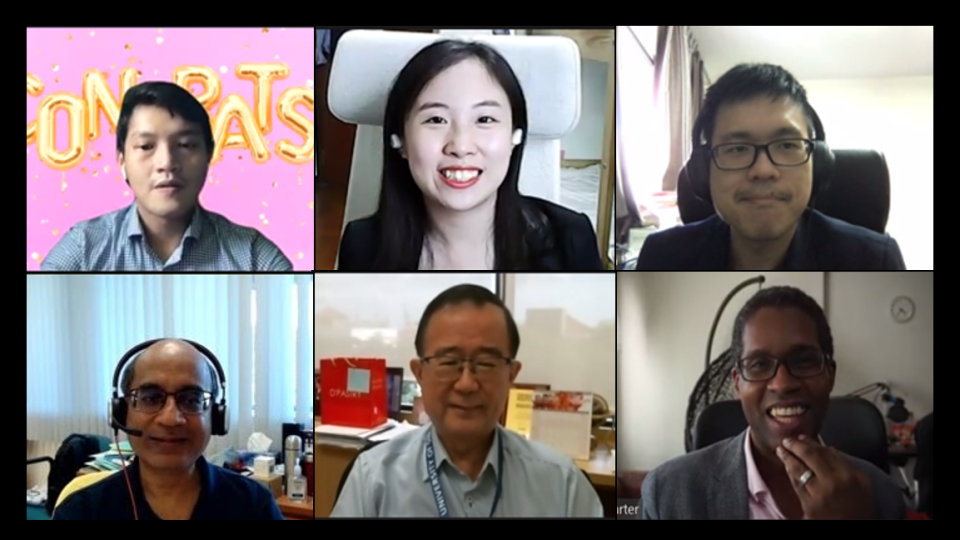Pioneer batch of NUS-FinTechSG Programme students graduate
Just two months ago, Mr Na Yi Rong had little to no knowledge of Financial Technology (FinTech). The Engineering Science graduate from the National University of Singapore (NUS) is now working full time as a product management lead at a local FinTech start-up, after receiving the job offer when he was participating in the NUS-FinTechSG Programme.
Jointly developed by the NUS FinTech Lab and Strategic Technology Management Institute (STMI), the programme was launched on 6 July 2020 to nurture Singapore’s next generation of FinTech talents and full stack developers. The pioneer batch of 25 students graduated on 10 September in a virtual ceremony after undergoing a structured two-month intensive full-time course on the fundamentals of financial services technology and business.
Students enrolled in the programme may choose to join full-time positions, internships, or access employment opportunities with partner enterprises, through an optional trainee stipend co-funding scheme supported under the SGUnited Traineeship Programme that was earlier introduced by the Ministry of Manpower and Workforce Singapore. All of the Singaporean students in the pioneer batch – including Mr Na – received either full time positions or traineeships with partnering companies such as DBS and UBS.
“I have learnt a lot about FinTech through this programme during the past two months, and I am excited to integrate my newfound FinTech knowledge with my existing background in engineering science to produce work with impact,” said Mr Na.
The skills acquired by the students, in areas such as front and back-end development, cloud computing, software development and IT operations, as well as database and security, give them an advantage in the job market.
Professor Mohan Kankanhalli, Dean of the NUS School of Computing and Chairman of the FinTech Lab Advisory Board, said, “We are happy to see our first batch of FinTech graduates find good positions at leading financial institutions and multinational corporations. In light of the global pandemic, more businesses are expected to adopt FinTech products or services to improve operational efficiency and enhance customer experience. Technology will be at the forefront of our ‘new normal’, and we look forward to seeing our graduates seize the many opportunities ahead of them.”
For Mr Charles Goh and Ms Madeline Lee, who enrolled in the programme after graduating from the NUS School of Computing and the NUS Business School respectively, the new skills will come in useful in their upcoming full-time jobs at a multinational payments technology company.
“In the technology sector, FinTech is definitely in an exciting growth stage now. The programme has empowered me with the latest tools and development practices such as React, DevOps and MongoDB. With my experience in technology and business, the technical skills from gained the programme complimented my skillset and spur my career growth,” Ms Lee said.
Mr Goh added, “I enrolled in the NUS-FinTechSG Programme to learn more about the different financial institutions, and how they are transforming to fit into the digital world we live in today. The valuable lessons on financial and technology concepts gave me a broad and rich overview of digital transformation and innovation within the FinTech landscape.”
Faculty members from the NUS School of Computing and various industry leaders who attended the online graduation ceremony were optimistic about the opportunities that lie ahead of the graduates.
Professor Alex Siow, Director of STMI, said, “As the Roman poet Horace said many years ago, ‘Carpe Diem’, or ‘Seize the Day’ in English. The world as we knew it has changed because of emerging technologies, innovations, and geo-political factors. COVID-19 has further fuelled the change and we must adapt quickly to the new environment and seize opportunities when they appear on the horizon. I congratulate our first batch of FinTech professional certificate graduates who are facing the challenges that are transforming the financial industry. I wish them great success and may the things they learned propel them to great heights in their career.”
“FinTech powers many of the platforms and tools we use in everyday life, spanning across different industries like transport, retail, engineering, tourism, and the arts. We believe that gaining these skills will provide our graduates a unique cross-disciplinary insight that enables them to not just meet market demands, but also to be better equipped to thrive in this ever-evolving world,” said Associate Professor (Practice) Keith B. Carter, Director of the NUS FinTech Lab.

